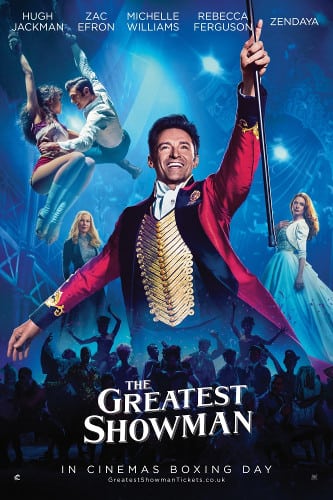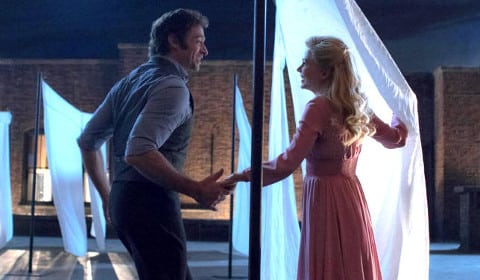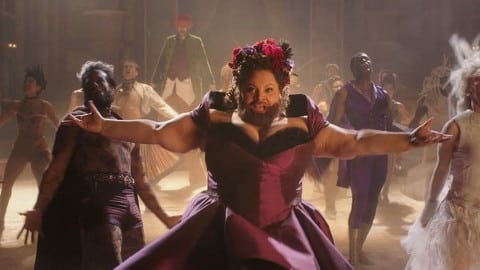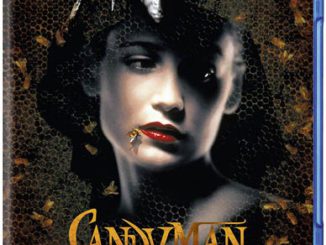The Greatest Showman (2017)
Directed by: Michael Gracey
Written by: Bill Condon, Jenny Bicks
Starring: Hugh Jackman, Michelle Williams, Zac Efron, Zendaya
USA
IN CINEMAS NOW
RUNNING TIME: 105 min
REVIEWED BY: Dr Lenera, Official HCF Critic
Young P. T. Barnum spends most of his childhood seperated from sweetheart Charity Hallet due to her father’s objection to Barnum’s poor prospects, but marries her as an adult anyway and they go on to raise two children in New York. Barnum is fired from his job as a clerk at a shipping company after the company goes bankrupt after the sinking of their trading ships in a typhoon. He takes out a large loan from a bank, deceiving the bank into using the sunken trading ships of his former employer as collateral. He uses this loan to build Barnum’s American Museum, an attraction showcasing various wax models of subjects of interest, but sales are slow, and, on the suggestion of his children, he endeavors to search for various ‘freaks’ to serve as performers….
No it’s not a horror film you’may say, and, though HCF has always been part ‘everything else’ as we all enjoy various kinds of films, gone are the days where I try to chuck in a review of everything I’ve seen at the cinema. However, I do enjoy my musicals, and I never got around to reviewing La La Land [though it will feature in my forthcoming top 30 film rundown of 2017], so here’s a review of the latest major screen musical, a film which I expected a great deal from. In a way, your enjoyment of The Greatest Showman may very well depend largely on how accurate to true events you want your films to be, and how much you know about the man who never actually said the quote: “There’s a sucker born every minute”. For example, Barnum initially hired his collection of ‘freaks’ as exhibits, and required to sit still and silent while his customers paid for the privilege of laughing and cringing at their unconventional appearance. They could have easily shown this in the film, then shown Barnum realising how much he was exploiting his employees and changing his approach. But no, it’s all about sanitisation. For goodness sake Charles Stratton, the little person who performed under the guise of General Tom Thumb, did not begin his performing career as a 22 year old but as a four year old who had to smoke cigarettes. I think that the apparently large number of reviews criticising the film’s white-washed approach are at least partly justified, myself sometimes feeling uneasy at it.
Of course this wouldn’t matter too much if the film was successful in most other aspects. There are sequences where it does catch fire, and its themes of prejudice, acceptance and letting one’s ego get too big can’t be argued with, but it’s weakened by its dreary story [you could successfully guess nearly all of the story beats] which has no surprises in it whatsoever [the stage musical Barnum covered rather more], and is severely hampered by its weak soundtrack. Having contemporary-style music for a musical set in the past rarely works [and even Moulin Rouge, which this film seems to be partly inspired by but rarely having any of its bravura and style, took some of its pop songs and changed them into a more time accurate/Broadway style], but can be partly forgiven if the music’s actually good. Unfortunately, the songs here, clearly inspired by the likes of Katy Perry, are lacking in so many ways: the tunes are forgettable and often consist of the same repeated phrases and chords that you get in much of the dreck that clogs up the charts these days, the lyrics are mostly boring inspirational messages, and the instrumentation is subpar and synthetic. Songwriters Benj Pasek and Justin Paul, fresh from their Academy and Tony winning turns in La La Land and Dear Evan Hansen respectively, don’t seem to have tried very hard with this score. It’s only an hour and a half since I saw the film, and I can’t remember a single tune properly.
So we open with a circus sequence where Barnum takes us on a dazzling tour of the ring, filling the screen with fine choreography.“Just surrender cuz you feel the feeling taking over”, Barnum sings seductively, though the song The Greatest Showman is just bland despite thumping percussion reminiscent of Queens’ We Will Rock You. One good thing though – Hugh Jackman really shows that he can sing. Despite having sung on stage, I wondered if his good singing reputation was a myth after seeing the film version of Les Miserables, but now it’s obvious that the director of that film Tom Hooper, for reasons unknown [though he made a lot of odd and poor choices on that travesty of a fantastic stage show], told Jackman to sing in a very low and narrow range. Anyway, we then switch to Barnum’s childhood and the next number A Million Dreams, possibly the best one in the entire film, playing over a nice montage which takes the young boy and the young girl who we see into adulthood, the two leaping and twirling across the rooftop of their tenement, bed sheets on the line virtually billowing in time to the beat. The film here really seemed to be succeeding in what it set out to do for me, though it only occasionally reached those heights again.
Fired from his job, Barnum first builds a wax museum which fails to attract many customers, and then a circus which gets a bad review. Barnum circulates the review and public interest becomes high, though of course there are some who object to the unusual human beings who are on stage. This hatred is very thinly conveyed, but then so are most things in this film which often feels like it’s been severely cut down. The credits feature the names of six editors! Searching for ways to further his reputation and credibility amongst the upper class, he meets rich playwright Phillip Carlyle and convinces him to join his venture with promises of liberation from the pressures and various struggles of his life. Upon Carlyle’s arrival to the venture, he becomes enamored with one of the performers, Anne Wheeler, an African/American acrobat and trapeze artist. Carlyle manages to arrange for Barnum and his troupe to meet Queen Victoria, and it’s there he meets Jenny Lind, a famed European opera singer, who he convinces to perform in America, with himself serving as marketer and manager, and with whom he begins to like rather too much. Barnum begins to lose his way, neglecting his wife and performers, and you could write the rest yourself. Of course tried and tested plots aren’t neccessarily a problem, but there are times during this film where story turns don’t seem believable and are just there because they’re expected, while the characters register more as cardboard cutouts than flesh and blood human beings – though that’s not surprising when the film often seems to jump from scene to scene.
The cast can all sing and dance pretty well [this is one area, though probably the only one, where this film betters La La Land], though their voices aren’t favoured by the horribly processed sound recording typical of much modern pop music. Probably the best performed song is Rewrite The Stars, where Zac Efron and Zendaya as Philip and Ann do their very utmost to bring some emotion to the music while she flies on the trapeze far above him, and he tries to climb up the ropes to meet her. Up, down, they both go, sometimes coming together dangling above the ground, or sweeping in a wide circle together around the periphery of the tent. The choreography is wonderfully smooth and the two performers [say what you want about Efron, he can do this sort of thing expertly] have terrific chemistry. It’s one of those lovely ‘falling in love’ sequences that musicals, by their very nature, can probably do better than any other genre. Elsewhere Ashley Wallen’s choreography tends to be nearly all power stomps and furious turns with little grace, while cinematographer Seamus McGarvey goes in for too many close-ups during some of the big moments, though that’s nothing new today and I’ve certainly seen far worse. There’s little attempt to disguise the sets, which is one indication that director Michael Gracey was directly trying to emulate old Hollywood musicals, though he doesn’t seem to have much of an idea of why they work.
For a film which preaches diversity, The Greatest Showman only gives two of the ‘freaks’ significant screen time, the rest functioning as little more than extras. At least Keala Settle as Lettie Lutz the bearded lady gets an anthemic number This Is Me which nicely shows her transformation from timid shame to fearless diva. Jackman is okay, but sometimes struggles to bring some depth to his character. I don’t feel too great about criticising this film too much – it’s a well intentioned attempt at a happy family movie, in a genre not very prevalent these days, with little violence and little CGI, and containing good messages. It’s probably hard to seriously dislike unless you really let the facts bother you. But the fact remains that, despite a game and often talented cast, The Greatest Showman is something of a misfire – though a decent soundtrack would have helped tremendously.










Be the first to comment